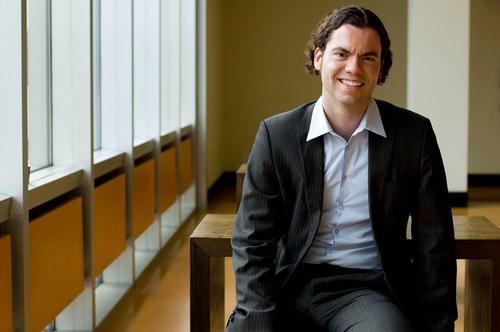Achieving Success with Proteins
Freie Universität chemist researches functionalization of proteins
Apr 27, 2011
Christian Hackenberger has just accepted an appointment as professor of bioorganic chemistry at Freie Universität Berlin.
Image Credit: Markus Wimmer / www.markus-wimmer.com
The awards just keep rolling in: At the start of April, Christian Hackenberger received the Karl Winnacker Instructor’s Fellowship for exceptional academic achievement. The German Chemical Society (GDCh) had just recently granted him the ADUC annual award for candidates completing the habilitation process. And on May 9, the 34-year-old Hackenberger is to receive the 16,000-euro Heinz Maier Leibnitz Prize from the German Research Foundation (DFG), considered the most important award in Germany for the next generation of scholars and scientists.
The jury, which is composed of members of the DFG and representatives of the Federal Ministry of Education and Research, cited Hackenberger’s status as one of the most promising young German scientists in the field of bioorganic chemistry as one of the reasons for its decision. The jury also mentioned that Hackenberger has made an international name for himself within just a short period with his work on development of chemical methods in particular, continuing that the “Staudinger phosphite ligation” he developed – a highly selective chemical reaction that takes place under ideal mild conditions for biological applications – facilitates the specific linking of proteins with organic substances. This targeted functionalization of proteins is one of the biggest problems facing the field of biological chemistry, and it is Hackenberger’s field of research: “What makes our experiments special is that we combine chemical methods with biochemical processes. By biochemical, I mean that we do not produce our starting material ourselves by setting up one reaction after another, but rather we have bacteria or entire cells take over this task.”
As initial substances for chemical reactions, Hackenberger uses proteins that are modified and refined. He describes the process by saying, “In nature, there is a mechanism by which specific enzymes transform proteins into multiple different variants, each of them with different properties. This fundamental process is what interests us.” That same process, Hackenberger continues, controls almost all of the complex processes that take place within cells, such as cell division and transportation processes. “What we aim to do in particular is replace the enzymatic reactions with chemical ones, so that we can study and understand them even better. In short, we want to execute chemical reactions under cellular conditions,” Hackenberger says. By doing so, he says, researchers could lend certain proteins a more stable form, for instance, or make them visible under a microscope. The stable protein could then also be used in pharmaceuticals.
After completing a postdoctoral period at MIT, Hackenberger moved in 2005 to Freie Universität Berlin, where he has headed a DFG Emmy Noether research group since then.
Further Information
- Prof. Dr. Christian Hackenberger, Institute of Chemistry and Biochemistry, Freie Universität Berlin, Tel.: +49 (0)30 838 - 52451, Email: hackenbe@chemie.fu-berlin.de

